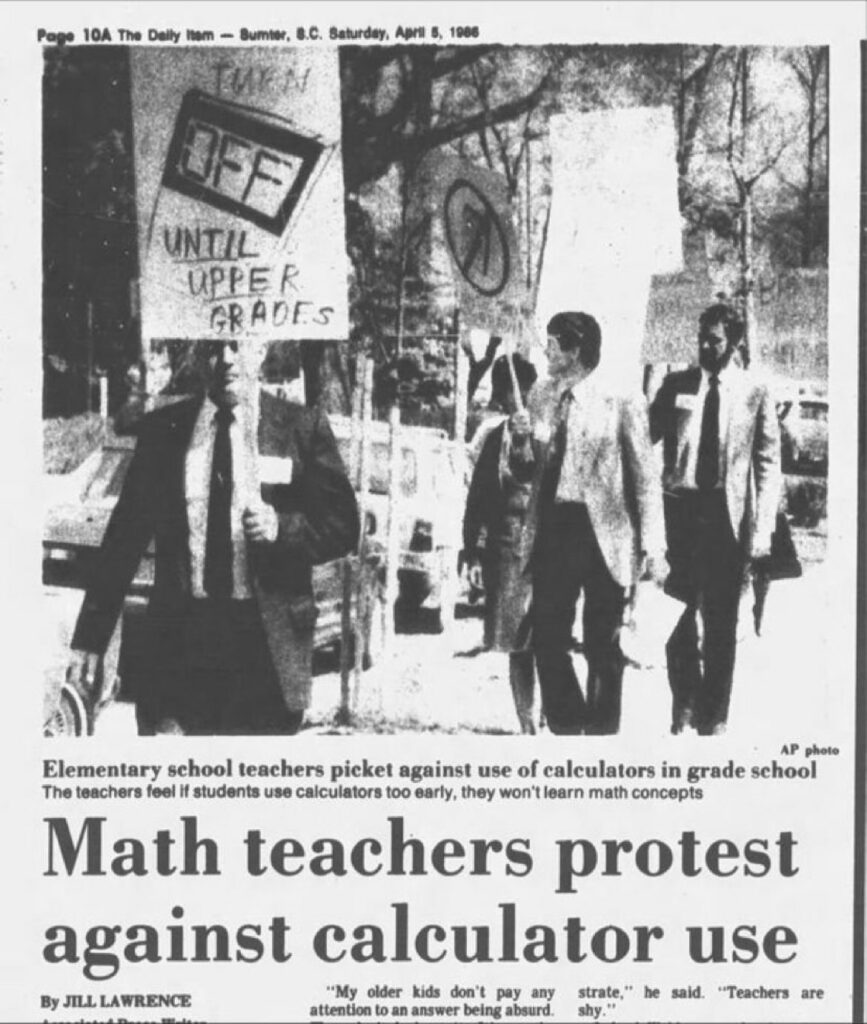When discussing AI, I’m reminded of this old newspaper clipping.
As calculators proliferated the classroom, teachers angrily took to the streets in fear of what would happen. But what actually happened was…well, mostly good. Calculators supplemented our study of arithmetic, made us more efficient, and raised the bar for math literacy. I believe AI is the English teacher’s calculator.
I cannot deny the efficacy of a chat generator in assisting a student with essay composition. If used correctly, it can give them any number of ideas to supplement their writing: research questions, search terminology, counterclaims, revisions, etc. It can do things for them in seconds that I, as their teacher and aide, would need more processing time to accomplish.
We can’t ignore it. We are going to have to reinvent the way our classrooms function in order to properly utilize this new tool, and those boundaries are still very much undefined. One thing we absolutely must not do is continue running from the issue as if it will ever go away. It is here. And, yes, it is scary. However, if we can just reimagine our processes, we will find ourselves on a higher plane of learning. The redundancies that we endlessly re-teach in the English classroom will go by the wayside as we embrace new ways of writing and thinking. We must only be willing to start the process of re-invention.
There’s a scene at the end of Fahrenheit 451—Ray Bradbury’s classic and contentious cautionary tale—that starkly underlines one of the novel’s subtle themes. After a lifetime of burning books as a ‘firefighter’, the newly jobless Guy Montag stumbles upon travelers living on the outskirts of civilization. The travelers have each dedicated their lives to remembering books, serving as the imperfect keepers for stories that would otherwise be lost to the world.
As Montag learns about their way of life, he watches the men huddle around fires for warmth. He notices how they use fires to cook their food. Fire, the weapon he had used to destroy culture throughout the book, was now a benevolent tool.
Funny enough, Bradbury’s writing often warns against the dangers of an overreliance on technology; however, this scene alone reminds us that ethical failings are forever man-made. Technology is a tool. Like fire, we can use AI to burn everything down. Or, like these travelers, we can use it to enrich our lives. The decision is in our hands.
When I have the AI discussion with my classes, this is the moral conundrum that I present them with. Yes, the tool can absolutely write your essays for you. But, in that same vein, your car could be a death machine. Or it can take you to the hospital. Your knife can cut someone. Or it can chop your vegetables up. We must be taught how to use the tools given to us correctly—and we must choose to use them correctly.
Like the Phoenix, we are going through the fires. But what emerges from those flames will be rebirth.
P.S. Montag is German for Monday—the start of a new week. The logo of the firefighters is a salamander: if you lop off the tail, it’ll grow back anew. Every major symbol in the novel points to new beginnings. That’s what we have to be willing to embrace—a new beginning.



